Alex has been working with us for about a year. We helped him to write a book – and he’s already planning the next one.
Alex is in his early 70s, and had never written a book before. However, when the idea came up during a call with his Support Coordinator, he was interested. Alex says, “I knew I had enough stuff to say, but I just wasn’t sure I was ready at that time.”
Alex decided to go for it, and the book was recently printed. It’s called ‘Priests Don’t Dae That’. It’s about Alex’s life, mainly his childhood in the 1960s. He wrote it with the help of Lea Taylor from the Book Whisperers. The Book Whisperers help people to write books.
The writing and editing process worked well. Alex explains: “I’d put pen to paper, and then I would meet up with Lea and give her my pages. She would then put it all together for me. And she designed the book cover for me too.”
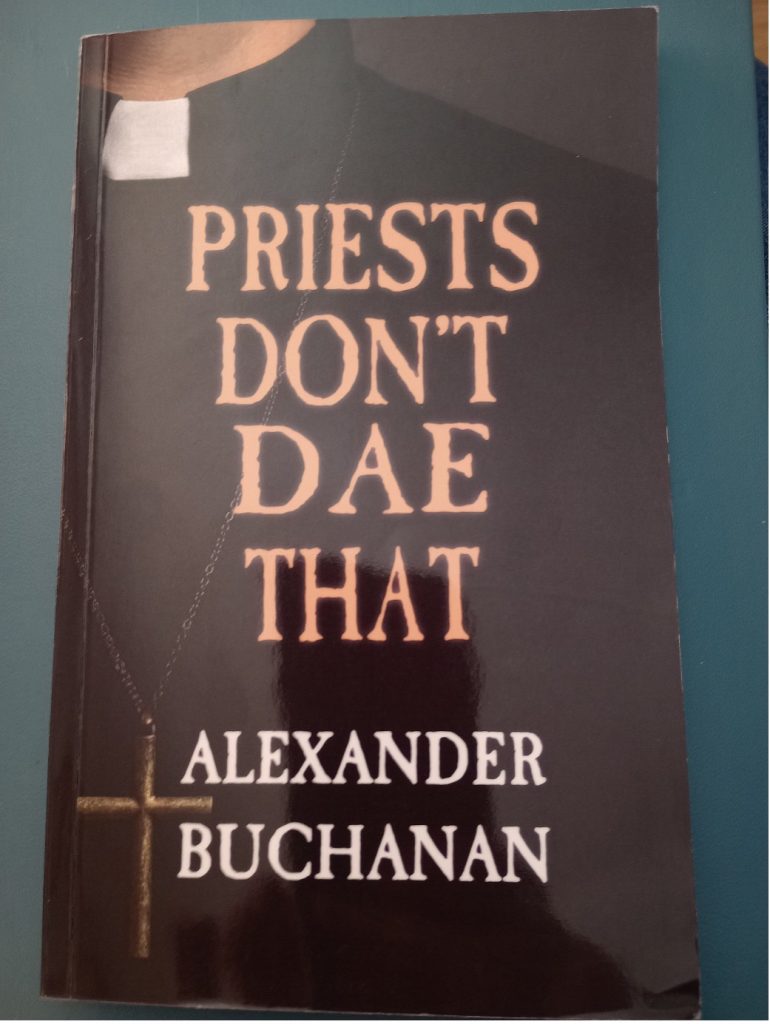
It took Alex just a month or two to write the book: “Once I started writing, it came quite easily.”
Lea really enjoyed the process too. She told us “It was a joy working with Alex on so many fronts.” Lea told us how dedicated Alex was to writing his book. She said that “best of all was witnessing such a wonderful change in him as the work and his confidence progressed.
His story was fascinating, and I’m delighted to have helped Alex produce this powerful piece of work.”
The people at the Book Whisperers believe that just the process of writing a book can make you feel better about things, and that was true for Alex: “It was a great experience. I wish that I got it all out sooner, honestly, but I’m glad I have done it now, and I’m now more level-headed. I’m very thankful to Future Pathways and to the Book Whisperers.”
And what’s next for Alex? “I might write another couple!”

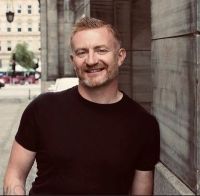
Dan Ross is a transformational life coach, helping people to move towards their goals using the resources and relationships they already have. As Dan says:
“My work is all about working in the here and now, and making a plan for the future.”
He has developed a programme called “Ignite Your Inner Warrior.” The programme is about helping people to discover their inner potential.
Previously Dan was a counsellor, working in crisis settings. This gave him a wealth of experience of working with people in challenging life circumstances, which he is able to apply in his current role as a life coach.
The process
Dan works with people from a wide range of backgrounds and life experiences, and feels that it is important to treat everyone equally. Central to Dan’s work is developing a mutual, trusting relationship with people so that they can work effectively together.
The process starts with a free session before starting to work together. During this session Dan meets the person he will be working with, and together they explore if life coaching is right for them. They also talk about how they will work together. Dan finds this helps people feel less anxious about it.
During sessions, Dan works with people to become more aware of their limiting beliefs. A limiting belief is a state of mind which can block someone from moving towards their goals. Sometimes people are not aware of their limiting beliefs.
By helping people see these blocks, Dan helps people transform their beliefs about themselves into more positive ones. Dan encourages people to identify values they wish to develop and embody. He says:
“The values you choose should be the opposite of your limiting beliefs. For example, if you struggle with people pleasing, one of your values could be assertiveness.”
Dan supports people to master their values and make them part of their identity and everyday life. He helps them to reframe their thinking and find new perspectives on challenges. This can help people to feel more able to work through self-criticism, and to feel more in control of their life.
Dan also runs a free mindset group for people he works with. People in this group attend events and workshops, and take part in challenges like cold water exposure, climbing mountains, or even free-falling.
Working with Future Pathways
Dan heard about Future Pathways when a Support Coordinator, Andrew, called him to enquire about his services. Andrew was working with someone who wanted to explore how life coaching could help him achieve his goal of becoming a motivational speaker. Dan describes his experience of working with Future Pathways:
“It has been first class. The Support Coordinators have been personable and positive. I have had no communication issues at all. Any questions I had were quickly answered.”
Dan believes that life coaching is most impactful when people are ready to commit to change in their life, and he feels that everyone Future Pathways has connected him with has been ready to work together.
He also encourages the people he works with to stay connected with Future Pathways, and to share how they are doing with their Support Coordinator. This helps Dan work alongside Future Pathways to help people achieve their goals.
Impact
Many people who Dan has worked with have achieved things that might have seemed impossible before their work together. For example, some people have started businesses or overcome fears to complete personal challenges. Some people tell Dan that his coaching has changed their life. It’s clearly a very successful partnership, which we hope will continue and develop for many years to come.
Find out more about Dan’s work at www.danrossmotivation.co.uk
We work with Matter of Focus to help us evaluate the difference we make and see how we can improve. We spoke to Ailsa Cook, Co-Founder and Director of Matter of Focus.
Can you tell us a bit about Matter of Focus and the work you do?
Matter of Focus is a purpose-led company and B Corp based in Edinburgh set up by myself and co-founder Sarah Morton in 2017. We support public and third sector organisations to understand, evaluate and track the difference they make.
Sarah and my paths had crossed several times during our long and established careers in academia, where we had both kept one foot firmly planted in the real world of influencing policy and practice. We both really knew that organisations needed better tools to evaluate their own impact, tools that would empower them to learn in real time thereby deepening their understanding of their work, which is what’s required to really make the best difference possible. So that is what we set out to provide.
Matter of Focus offers a practical and meaningful approach to understanding and evaluating change, along with expert support, and we have developed our own software OutNav to hold the approach and help organisations embed ongoing self-evaluation, learning and improvement.
How have you worked with Future Pathways so far?
We’ve had the pleasure of working alongside Future Pathways since 2018. They were aware of my expertise around evaluating personal outcomes and approached Matter of Focus when they were looking for support with their evaluation and research, which they knew was an important part of their work to build the evidence base for a new and pioneering service.
Initially, we produced a scoping report to really understand the service; looking at the context in which Future Pathways was working, understanding how they make a difference and their progress towards that. This involved speaking to people that used the service as well as staff and other partners. Since then, we provided ongoing support and supervision for Future Pathways’ researcher as they were using OutNav to embed evaluation into their work.
In 2020 we helped Future Pathways to produce their own impact evaluation, which was a substantial piece of work that mapped out how the service made a difference and brought together lots of feedback, data and evidence from across their work.
Recently we’ve been working very closely with the Impact and Evaluation Lead to supplement the information they had available to evaluate the impact of Future Pathways. This included running focus groups and workshops and doing some additional analysis. We see ourselves as a learning partner for Future Pathways offering a bit of additional input at key points.
We recently worked together to develop the Stepping Stones report. What can you tell us about the importance of collaboration when evaluating impact?
We believe it’s important for organisations to own their own evaluation: that they are clear about what they need to know and what their data is telling them and, critically, that people in the organisation are really involved in making sense of that data because that’s what leads to meaningful and efficient learning and improvement. However, we recognise that evaluating complex relational services is incredibly challenging. We have been able to bring specific expertise, guidance and an approach to evaluating complex interventions. With Stepping Stones, we were also bringing objectivity: people could tell us things they might not tell Future Pathways directly and we can see the service with a bit of distance and fresh perspective. Coupling this external lens with Future Pathways’ ongoing self-evaluation over quite some time is really powerful.
What did we learn together about Future Pathways’ impact in Stepping Stones?
This evaluation has cemented understanding of how Future Pathways makes a difference. We can be confident that their genuinely trauma-informed and relational approach to care coordination works and makes a difference to people as, building on previous evaluations, the evidence is now clear.
Additionally, the Stepping Stones report has strengthened understanding about Future Pathways’ role within the wider system and the impact they have had by working closely with Delivery Partners to make sure they’re able to support people effectively. They really understand what they need to do next to shape the system.
Future Pathways’ commitment to understanding the difference they make and their focus on embedding and sharing ongoing learning is inspirational and exemplary. We’re proud of our learning partnership.
Our latest Quarterly Report is now available to view. It covers our work from January to March 2023. It shows what we’ve learnt, and includes key stats and feedback from those who access Future Pathways.
This quarter:
28 people started working with a Support Coordinator.
More people heard about Future Pathways through word of mouth than from anywhere else.
259 people accessed support from our delivery partners.
We worked with 70 active delivery partners.
People told us they wanted to improve their mental health, their living environments and develop new skill.
People told us working with Future Pathways made a positive difference to their lives. For example, by giving them sense of pride in themselves or their achievements, and ways of coping.
People told us where they heard about Future Pathways
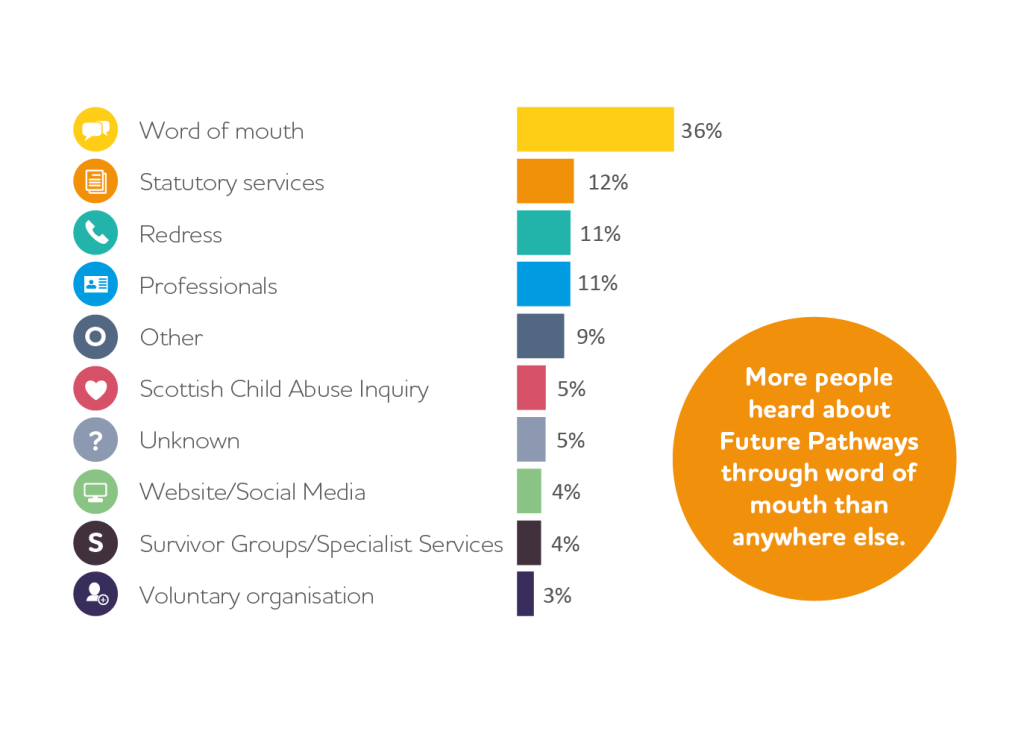
Future Pathways linked people with a range of delivery partners this quarter
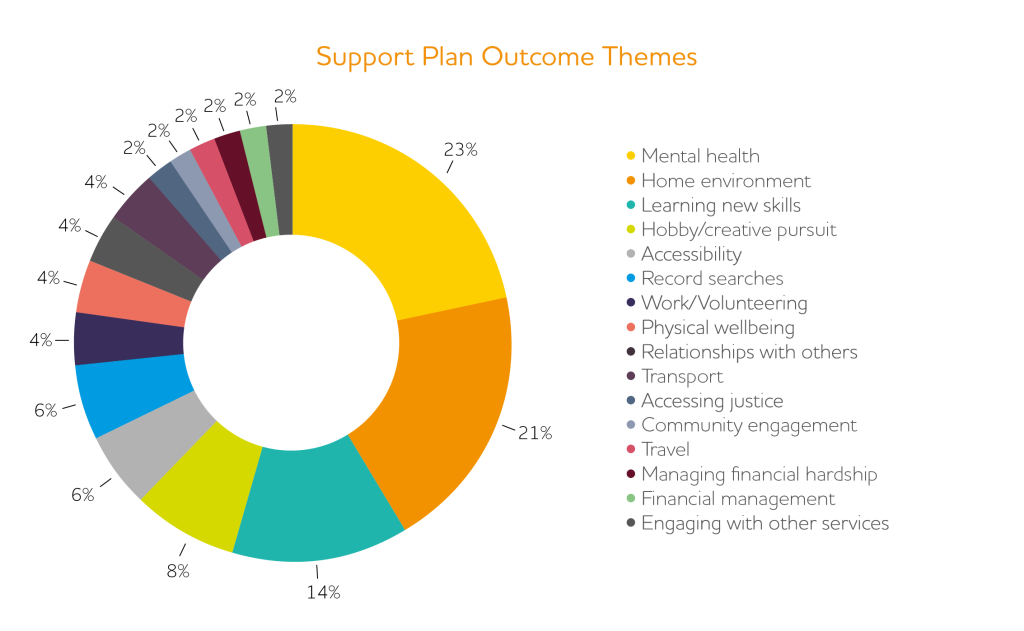
People told us what they hoped to gain from working with our service
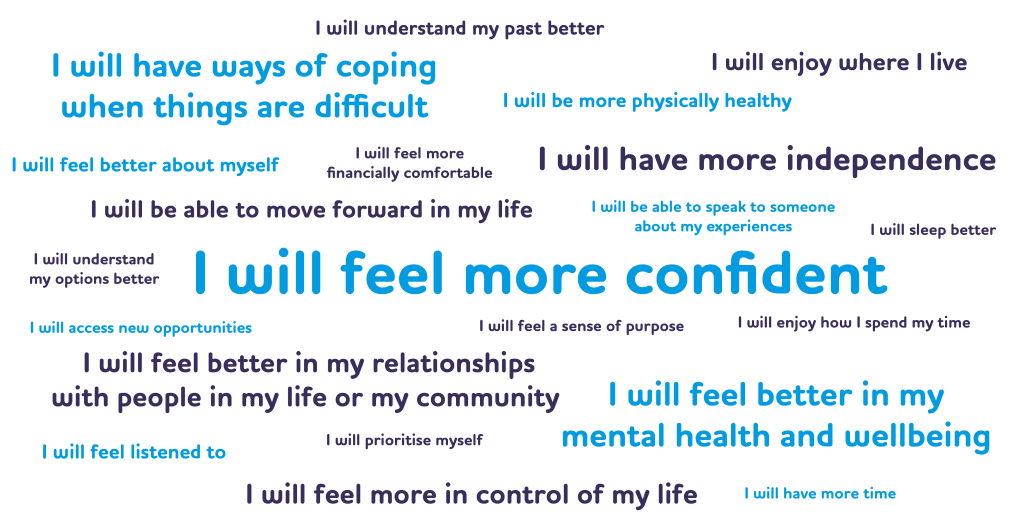
People told us about the most impactful support they accessed through Future Pathways
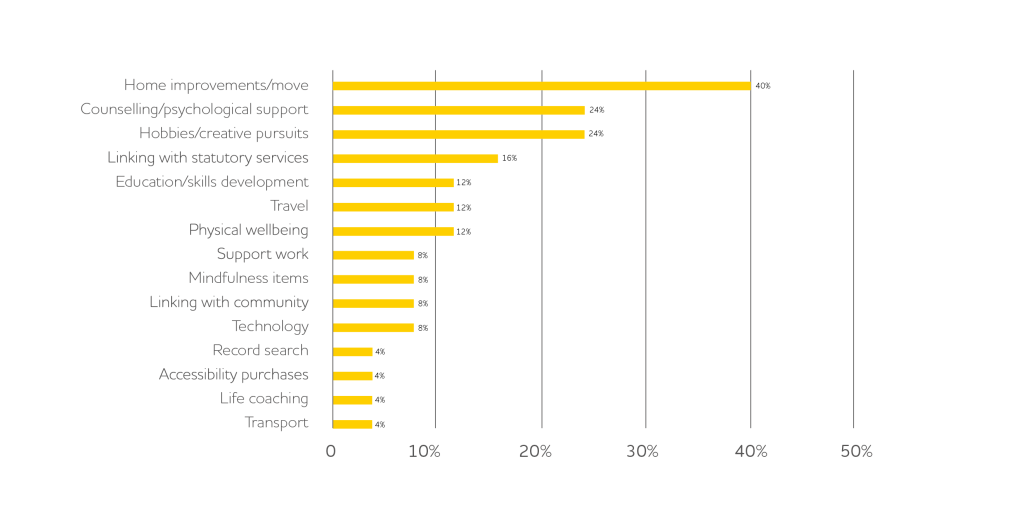
Our full report features further infographics, feedback and a breakdown of our financial spend. Read the full report.
Rikki heard about Future Pathways in 2017, after contributing to the Scottish Child Abuse Inquiry. He started working with a Support Coordinator called Lara.
Rikki had been struggling with his mental health and particularly with flashbacks. Lara put Rikki in contact with the Anchor, the Glasgow Psychological Trauma Service. Through the Anchor, Rikki accessed EMDR therapy. This is a type of therapy which can help people process trauma. Rikki found that this experience helped him to look at past experiences from his present perspective, as an adult. Together Rikki and Lara also explored how complimentary therapies, such as reiki and mindfulness techniques, could benefit his mental health. This helped Rikki find useful approaches to cope with flashbacks.
“I used to see one wee thing on the TV and I was back there in my mind. Now I have the techniques so that the flashbacks don’t stay with me.”
Volunteering has always been important to Rikki. For example, during the COVID-19 pandemic, Rikki volunteered to meet and greet people at his local hospital. After accessing support from Future Pathways, Rikki wanted to do something to support Future Pathways.
“You looked after me. You have got me to this stage. Now I want to give something back. I want to share what Future Pathways has done for me.”
Lara encouraged Rikki to get involved with Making Pathways Together. Through this project, people who have accessed support from Future Pathways gave us feedback to help us improve the service. Rikki also got involved in our survivors’ voice group, Voices for a Better Future. This group brings together people who are registered with Future Pathways with the aim of improving services for other survivors.
Currently, Rikki and other group members are working with Future Pathways to develop peer support within our service. Although at first Rikki felt hesitant to get involved in the group, being part of Voices for a Better Future has helped him feel more confident and helped Rikki move past feelings of shame and embarrassment that have affected his past relationships.
“It has given me a lot of confidence. My life experiences are what I bring to the table.”
Being part of this group has also helped him develop relationships with people who also want to make a positive change.
“We became closer as a group. The respect is there. […] It is all about helping others […] We laugh together. Sometimes there’s a bit of emotion. People want to be heard. I can’t advise but I can sit there and listen.”
Overall, being involved with Voices for a Better Future has been a very fulfilling experience for Rikki.
“Just being at the meetings, I know I am there for the right reason, to make people realise that they have a voice […] I feel passionate about Voices for a Better Future. There are a few tears, but we are doing it to better people’s lives.”
Maggie registered with Future Pathways in 2020. She had watched a programme on television about child abuse and this invoked deep feelings of anger. Shortly afterwards, she heard about the Scottish Child Abuse Inquiry on the news and called the Inquiry helpline number.
She was motivated to call the Inquiry by her relationship with her son. Because of her past traumas and the shame she felt, Maggie felt she had not been able to be the mother that she wanted to be. For example, Maggie struggled to play games or show physical affection with her son as a child because this was not modelled to her when she was a child. This was devastating to her. Maggie also contacted the Inquiry because she felt strongly that justice was needed, and it was important to her to be heard.
“I needed someone to listen. That was important to me because nobody ever listened.”
The Inquiry referred Maggie to Future Pathways and Maggie started working with a Support Coordinator called Lisa. Maggie met Lisa for the first time in person at a cafe, along with Maggie’s son. This was a big step for Maggie who hadn’t spoken to anyone apart from her son in a long time. Maggie recognised some people she knew at the café, and this was triggering. Lisa understood and they found somewhere Maggie felt comfortable. Maggie instantly felt comfortable with Lisa. She felt that there were no barriers up and it was as though they had known each other for years.
“I’ve never smiled so much in my life. She listened. She never once interrupted me. She would ask me [questions].”
It took time for Maggie to trust Future Pathways because previously she had negative experiences with other services which had made her feel poorly informed, dismissed, or dropped which made her feel as though she had done something wrong. Lisa understood how important it was to be consistent.
“Not once did she let me down. […] She has held up her end of the bargain. I felt I had somebody who I could trust.”
As time went on, Lisa and Maggie developed a trusting relationship and Maggie opened up about the anger she felt. Lisa always responded with compassion and never assumed what Maggie would want or need. Maggie appreciates that Lisa always checks in to make sure she understands what Maggie tells her, and to make sure Maggie was okay after an emotional phone call.
“She has been my backbone.”
Maggie enjoyed art when she was younger and was interested in finding a creative outlet. Maggie had been attending a local pottery class and had built up a good relationship with the tutor. However, this became unavailable locally which felt like a real set-back. Lisa supported Maggie to recover after this and to explore other options.
Maggie heard about a local studio delivering classes. Future Pathways used discretionary funding to enrol Maggie in a jewellery class. When this wasn’t the right fit, due to Maggie’s mobility challenges, Future Pathways supported Maggie to explore alternatives and Maggie engaged in classes in ceramics, mosaics, and stained-glass art. Nobody at the studio knew Maggie or her past which meant she felt able start with a fresh slate.
Lisa also supported Maggie to start working with a psychologist, Amy. Amy helped Maggie to develop coping skills to manage her triggers. Strategies included taking breaks from her phone and expressing boundaries in her relationships with others. Maggie felt believed by Amy and Lisa, which made this relationship work.
“I was allowed to talk, and somebody listened, and somebody believed me. That meant the world to me. Somebody had my back. Somebody was looking out for me. That was the most important thing. I would have known if they didn’t believe me
Now, Maggie continues to create and is currently making a piece for Future Pathways. Her mosaic incorporates an image of a yellow brick road to symbolise her hopes for the future. Maggie has a passion for poetry. Her poetry is inspired by Scotland’s slave-trade history, and she also writes about her personal experiences which she finds cathartic. Going forward, Maggie would like to write her life story and recently she wrote a poem about applying for Redress. Maggie feels it is important to give survivors opportunities to tell their stories. Maggie feels more able to stand up for herself and uphold her boundaries. She feels able to help and support others and has more faith in herself.
“I’m finding me, I’ve got a voice now, I’ve got courage. […] They gave me the strength. They let me find me. They gave me control back.”
While Maggie finds it distressing that abuse still happens in care settings, she feels motivated to contribute to positive change. She feels it is important for services to learn from mistakes and to be transparent and honest when making commitments. Maggie feels that Future Pathways should provide support for the children of survivors and address the inter-generational impact of trauma. This is informed by Maggie’s experiences with her son with whom she has now developed a positive relationship.
Maggie feels that Future Pathways’ support has been lifechanging. After struggling with her mental health in the past, she now feels that there is someone in her life who can help.
“Future Pathways are a fantastic organisation […] They’ve given me a sense of humanity back. When somebody has got your back, that’s a true friend…you feel it.”
See How We Help to find out more about how Future Pathways can help you.
Yvonne was previously involved in campaigning for better access to records. She heard about Future Pathways during a meeting with an MSP. Yvonne knew some people who had contacted Future Pathways, but she did not know what to expect from the service.
“It was quite daunting to call, especially if, like me, you are not comfortable talking to strangers.”
Yvonne started working with her Support Coordinator Adam. She was nervous about working with a male, but Adam was easy to talk to and put her at ease by listening attentively.
“I don’t trust easily but I was able to build trust with Adam. It made a massive difference to have someone to talk to who was listening to me and supporting me, and who knew what I have been through. You don’t necessarily talk about it all, but they know and that helps.”
When Yvonne registered, she felt her life lacked direction. Yvonne had conversations with Adam about what mattered to her and where she found purpose before. In the past, Yvonne did charity work in her local community. Yvonne reflected that she had found volunteering rewarding. These conversations helped Yvonne gain perspective on what she wanted her next steps to be.
“It is important to me to give back and turn my negative experiences into something positive for others.”
Yvonne explored some volunteering options and Adam encouraged her to “think big.” Hearing Adam’s faith in her helped Yvonne feel capable and confident.
“I didn’t believe in myself. I thought, am I confident enough to do that? I did doubt myself. But I thought, well Adam believes in me. It helped me believe in myself.”
She saw an advert for victim support volunteering. She felt she would enjoy working with different people in different circumstances, and that there would be a lot to learn. Yvonne applied and interviewed for the position, which was an intimidating experience.
Now Yvonne is training for the role which involves supporting people who are going through the justice system. Yvonne is excited about the opportunities this will open up for her.
“I am excited about the journey. Now I feel I have a purpose. Look at where I came from and where I am now. I wasn’t confident. I didn’t believe in myself. I didn’t know what to do a year ago. Now I have taken this huge step of becoming a Victim Support Worker to help others.”
Future Pathways also helped in other ways. With Future Pathways support, Yvonne has been attending pottery classes. This is a creative outlet for Yvonne and an opportunity to spend quality time with her daughter. Yvonne was also referred to the Anchor, Glasgow Psychological Trauma Support Service, and this helped her to understand herself better. She continues to work on focusing on the here and now with Future Pathways’ support.
“I have gained a sense of completion from working with Future Pathways. I feel like I know myself now. I felt so lost and now I don’t. I don’t feel like a victim anymore. Support from Adam has kept me focused on the present and my future. It has transformed my mindset and my life. Friends and family notice a big difference in me as well. My daughter told me she is proud of me. They say I am a different Mum now – they see a strong, confident woman. Working with Future Pathways has brought me and my children closer together.”
See How We Help to find out more about how Future Pathways can help you.
Future Pathways supported Rita to access counselling around two years ago following a diagnoses of complex post-traumatic stress disorder. This work included supporting Rita to develop coping strategies for her severe anxiety.
Before working with the psychologist, Rita found it difficult to complete everyday tasks like going to busy public places. She felt permanently on high alert and found it difficult when people approached her or came into her personal space.
Rita developed a positive working relationship with her counselling psychologist who took the time to work on creating a dynamic where Rita felt safe and secure.
Rita’s Support Coordinator felt that a crucial contributor to the success of this working relationship was taking the process at Rita’s pace, adapting to Rita’s evolving needs, and taking the time to develop a safe foundation from which Rita could start working through her trauma and begin to build coping strategies.
Recently, Rita completed a review of her support with her Support Coordinator who shared that the work with the psychologist “has been absolutely life changing for her, just incredible.”
In the review, Rita shared that she now feels much more able to go out into public spaces and do things that previously triggered her anxiety. Other people in Rita’s life have also noticed a positive difference in her. Recently she went to a restaurant and was able to enjoy her meal despite others sitting near her and recently she went to a supermarket and suddenly realised she wasn’t feeling panicked.
Rita was able to have a conversation with someone she had never met before in a public space without her anxiety becoming overwhelming.
Although Rita’s anxiety does still affect her, she feels proud of herself for taking these strides. By engaging with therapy, Rita has learned tools to support her to manage her anxiety, and now feels ready to work on her trauma with her psychologist while continuing to apply these tools to her everyday life.
See How We Help to find out more about how Future Pathways can help you.
Marie* heard about Future Pathways after participating in the Scottish Child Abuse Inquiry. Marie works full time and cares for a family member, so she felt spread thin when she first reached out to Future Pathways.
When she met her Support Coordinator, Marie shared that she felt like she didn’t have a lot of time to herself. She felt that she often prioritised other people’s needs, and this had affected her confidence. Marie’s Support Coordinator helped her to consider what her interests were, and she shared that she had always been interested in gardening. Marie had worked in a garden several years previously and was interested in picking up these skills again.
With her Support Coordinator’s support, Marie started looking into volunteering opportunities in her local area and found a local community garden.
With her Support Coordinator’s encouragement, Marie started volunteering there once a week. This gave her some dedicated time in the week for herself and made her feel more confident and valued, while also allowing her to gain more skills in gardening and feel more engaged with her local community
Sadly, shortly after starting to work with Future Pathways, a close family member died. While grieving this loss, Marie and her family were also struggling to pay the costs of the funeral, which caused worry and strain during an already difficult time. This was made more difficult because they had lived far away.
Marie shared this challenge with her Support Coordinator and was surprised to hear that Future Pathways could help pay for travel and accommodation costs for her to attend the funeral.
Her Support Coordinator also helped Marie contact the local authority to explore options for funeral cost support which reduced financial pressure considerably. This enabled Marie and her family to grieve their loss without worrying about getting into debt.
After returning from the funeral, Marie started struggling with her mental health as thoughts and memories from her past in care resurfaced. She decided to talk to Future Pathways about accessing counselling. Marie shared with her Support Coordinator how important it was to be able to relate with her counsellor so that she could feel comfortable talking about her trauma. Her Support Coordinator researched some options.
Marie attended the first session knowing that if she didn’t feel a connection with the counsellor, other options were available.
Marie chose a counsellor who she felt comfortable with and over time they developed a relationship which allowed Marie to explore how her trauma impacts her in the present. Future Pathways also provided funds for materials for a creative project which Marie did alongside counselling to express her life story. Marie feels this support has allowed her to develop a different, more rounded perspective on what she needs going forward. She no longer feels she is facing life’s challenges alone.
See How We Help to find out more about how Future Pathways can help you.
The Community Brokerage Network (CBN) works alongside Future Pathways to support people to achieve their outcomes.
CBN was established with support from the Scottish Government, Support
in The Right Direction (SiRD) Fund. They provide independent information and support to help people with social care needs choose how to use the resources available in the best way for them.
Brokers at CBN help people identify what support they require, find out information about the options available, and put a plan in place which meets their needs.
Recently, CBN worked alongside Future Pathways to support a client to develop his literacy skills. Michelle, a CBN Broker, tells us about this experience:
My relationship with Future Pathways works well because they work in a person-centred way, and they give us as a partner the time and flexibility to be person-centred too. This aligns with our ethos at the Community Brokerage Network which is about putting people first.
The client’s Support Coordinator, Mary, put me in contact with Cellfield U.K. Mary explained how trauma can affect people and what could be triggering for the client. We identified that the time and expense of travelling to attend sessions presented a barrier to the client.
We took the time to explore several options, but Mary also knew when to step back, and trust our experience and expertise as partners. She did not micro-manage.
We arranged for sessions to take place in the client’s local community, and we adapted the length and structure of the programme according to the client’s needs.
The client initially felt quite reluctant and low in confidence because of their previous experiences of education, so we took a relaxed, informal approach. The client enjoyed the process and attended every session without prompt. This experience seemed to increase the client’s self-belief and open up future opportunities to learn.
I enjoy working with Future Pathways because we have a respectful, open exchange of ideas. My opinion is listened to.
We feel comfortable to disagree with one another and discuss options. In my
view, the Support Coordinator role is invaluable. The Support Coordinator connects me with the
client and provides information which allows me to do my job more effectively. Having a link with a Support Coordinator makes my interactions with Future Pathways more human. I have a relationship with Future Pathways – it is more than just a referral process or a box-ticking exercise.
Working alongside Future Pathways has taught me the importance of expressing clear boundaries and expectations with clients and partners.
I have gained more patience by working with Future Pathways. Sometimes, we support people with complex needs, so I have learned that it can take longer to put the right support in place. Finally, working with Future Pathways has enabled me to shift my mindset as a practitioner. Previously, I believed that I knew what support people needed. Now, I learn from survivors what support they feel they need. It’s a shift from ‘fixing’ to acknowledging survivors’ autonomy over their support.
